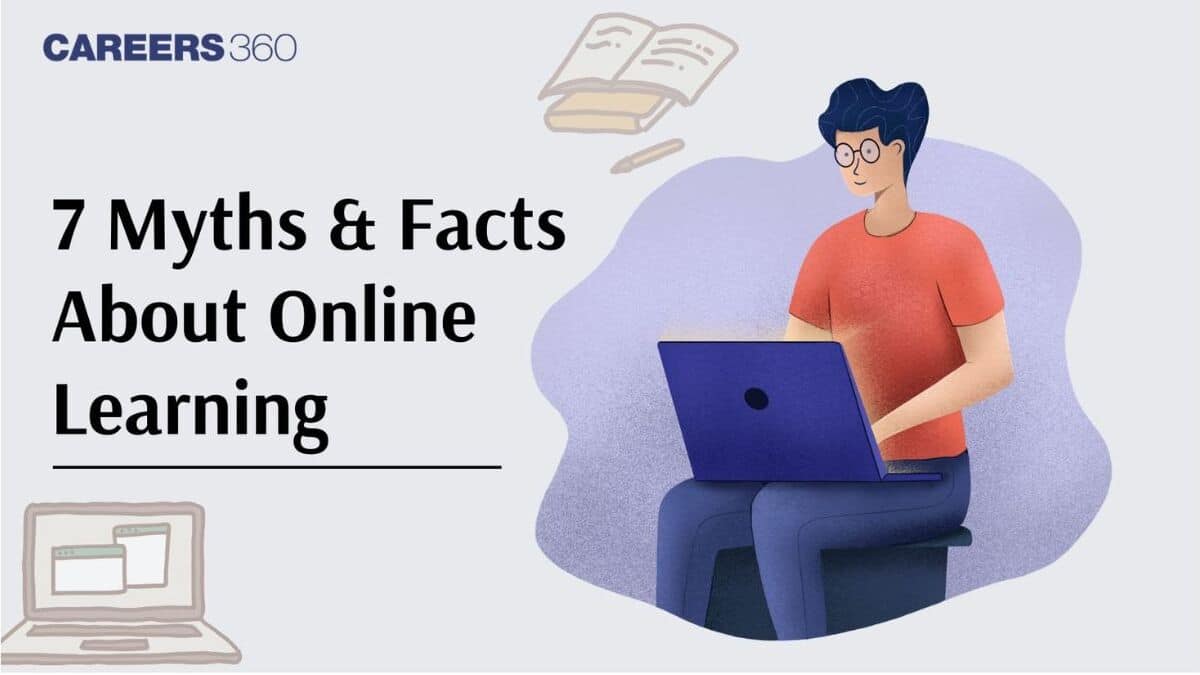7 Myths About Online Learning: Know Details Here
Online learning is gaining popularity for its flexibility, accessibility, and affordability. However, many have misconceptions about its quality, effectiveness, credibility, scope, and structure. These myths about online learning can take students away from studying and professional growth.

Students and working professionals must be aware of online learning myths and facts to make an informed decision about online degree courses. In India, online degree courses are UGC-recognised, making the programme valuable in the job market. The UGC approval also helps candidates get a variety of job opportunities.
Moreover, the advancements in technology have enhanced the quality of online education. Institutions now offer live classes, interactive tools, and industry-relevant curriculum same as traditional academic standards. As employers increasingly value the skills and flexibility developed through online degrees, the perception of online learning is positively shifting.
Common Myths About Online Learning
Online learning has transformed education by offering flexible, affordable, and accessible options for students and professionals. Despite its growing popularity, several myths continue to surround these programmes. The mentioned points below highlight the common online learning myths and facts everyone should know.
Online Learning is Not Credible
Students think that online learning is not credible. In reality, it is credible. Top colleges and universities provide UGC-approved online degree courses, which are recognised by employers. Online degrees have the same value as regular degree courses and provide the same quality of education.
Online Learning is Easy
Many students believe that studying online courses will be easy. Compared to regular degree programmes, online learning is more flexible and accessible, which makes it easy. But students have to be disciplined. Online learners have to strike a balance between jobs, study, and personal commitments. So, they have to make a proper plan for study and implement it effectively.
Online Learning Does Not Offer Interaction
In reality, online learning students can interact with their peers, faculty, and industry experts across the globe. Online learners can interact via live classes, discussion forums, group assignments, and workshops. They can increase their networking at a global level by interacting with international peers and professors.
Online Learning is Not Accepted by Employers
This is not the truth. Employers accept online courses from accredited universities. Pursuing online degree courses from UGC-approved universities opens the door to vast career opportunities in the global market. Several MNCs also accept online degrees from Indian universities. Students have to make sure to enrol in a UGC-recognised degree.
Also Read: Online Programs for Armed Forces: Check Where They’re Offered
Online Learning is Expensive
Online learning is more affordable than regular degree courses. The cost of a regular degree course is very high, as learners have to spend money on travelling, lodging and commuting. Online learning saves costs on these expenses.
Online Learning is Only for Specific Subjects
In reality, online learning provides a wide range of courses in various domains, such as management, computer applications, data science, commerce, and arts. Also, students can pursue an online degree in a variety of specialisations.
Online Learning is Only for Young Learners
There is no age barrier in online learning, and people of all ages can enrol in online courses. Online course students can be fresh graduates, working professionals, retired people, and homemakers. Online learning offers lifelong opportunities for anyone to upskill and enhance their knowledge.
Knowing these myths and facts about online learning will help individuals choose the right online programme from the right institute. Online learning provides flexibility, accessibility, and affordability which fulfil the needs of learners. Students can study online degree courses from anywhere and at their own pace.
Frequently Asked Questions (FAQs)
Students are expected to have a basic understanding of computers and the Internet. Learners with fundamental computer skills will find the online course platform easy to navigate.
Online degree courses are affordable and it is less expensive than regular degree courses. Also, it saves various costs such as commuting and campus facilities.
People of any age can pursue online courses, including students, aged people, homemakers, and working professionals.
Yes, online degree courses provide a variety of skills and knowledge that help students get job opportunities, salary hikes and leadership roles.
Yes, online degree courses are recognised by UGC, which makes them valid in the job market.